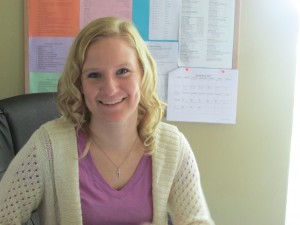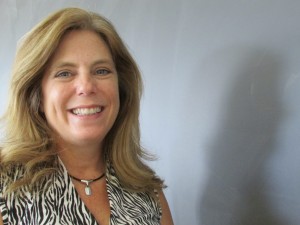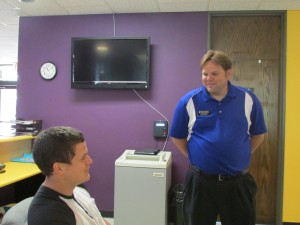Who can students trust on campus?
By Darien Walsh
The start of a new school year can be scary for a lot of students leaving home for the first time, and also prove to be difficult for those veteran students who have done it year after year. Whether they are stressed about classes, having roommate issues, experiencing homesickness, or dealing with something on a more serious level, there are several outlets on campus students can turn to and trust in times of need. So, who can students trust on campus?
A good place for students to start when looking for help is their Resident Assistant, or RA. RAs are students who live in the dorms that have completed training in conflicts, confidentiality, listening, and other related areas.
“RA’s are there for whatever,” said Student Activities Director and Area Coordinator of Breen and Tanner Halls, Amanda Aberle. “They’re a mix of a best friend, someone to find solutions to issues, and someone that can find resources.” RA’s also enforce policies to help students thrive and be successful.

Amanda Aberle, Area Coordinator of Breen and Tanner halls, is the next step above Resident Assistant. Photo by Darien Walsh
A step higher than an RA is an Area Coordinator. There are three Area Coordinators on campus: Amanda Aberle, the Area Coordinator of Breen and Tanner, Sharese Hall, the Area Coordinator of J&L, and Anne Marie Werthmann, the Area Coordinator of Ormseth. Area Coordinators are in charge of RAs and are there to help students with residential issues, and anything hindering their success in college.
Another source available for students to turn to are their teachers.

Heather Yeoman, Waldorf Adjunct Professor in communications and humanities, freely offers her help to struggling students. Photo by Darien Walsh
“Over the semester, students and professors bond,” said Heather Yeoman. “As a professor, I am aware of students’ lives, their concerns, classes, family, and issues that can affect them.” While your teacher may not seem like the first person to pop in your head to turn to, it’s nice to know they are aware students have other things happening in their lives besides classes. “Students have lives, and a lot of learning happens outside of the classroom in college,” said Yeoman. “I like to get to know the whole student. It’s an honor.”
Similar to teachers, academic advisors provide a different kind of trust. Students can go to their advisor trusting they will help with their future careers, charting their classes, giving advice specific to their majors, and giving recommendations and advice on life decisions.
The school nurse, Mary Mathiasen, is a person many students trust when it comes to their health. Mathiasen provides health services, and is a good person to talk to when you’re feeling sick. The school counselor, Jim Amelsberg, provides a confidential outlet for students ranging from feeling homesick, having anxiety and depression, to those experiencing conflicts at home or on campus, and everything in between.
For students who perhaps have a more serious issue, there are several resources on campus.
Campus Security, which is comprised of both staff and students, are available to students for late night escorts, access of areas, help with car issues, and for safety concerns. The telephone number to reach Campus Security is 641-585-8500.
Working closely with Waldorf College, the Forest City Police Department helps with crime and disturbance issues. While Campus Security makes rounds both on foot and in vehicle, the FCPD also patrols the campus. Officers meet with RAs, and work with the college to make it a safe environment.
With an office on Waldorf campus, Crisis Intervention Service also provides a safe environment and support to victims of domestic violence and domestic abuse, which include areas perhaps more relevant to college students like intimate partner violence, dating partner isolation, and date rape and stalking. Their services are free and confidential. “We’re lucky to have a great relationship with the college,” said Yeoman, who has been involved with Crisis Intervention Service. “It’s a great resource to students.” Crisis Intervention Service has a 24 hour hotline: 1-800-424-9071.
Lastly, a good person for students to go to is the Dean of Students, Jason Ramaker. Students usually go to Ramaker to file crime complaints and for serious incidents. “I support students and help them be successful,” said Ramaker. “Students usually come to me with out of class issues, and they can come to me about food, housing, safety, and security.” Trust is important for those students from larger areas, because larger areas tend to trust less than those of smaller areas. “There are always a few people you can’t trust,” said Ramaker. “You have to be smart with who you trust with your belongings, or your person. You can’t trust everybody, but Waldorf is pretty trusting. There’s an awful lot of people here you can trust.”

